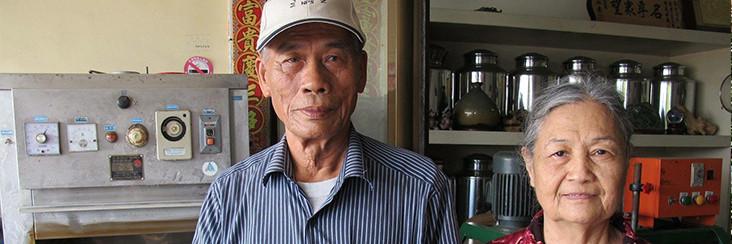
Aged Harbor Tea | Eco-Cha Tea Club
This month's batch of Aged Harbor Tea that is being shared with the Eco-Cha Tea Club comes from the most unique source of tea we've discovered to date. Located along the coast near the southernmost tip of the island, it stands alone both in its story and character. In the image above, Mr. and Mrs. Zhu proudly present their inherited family tradition that they have innovated upon to make a unique type of tea.
The other handful of families who continue this local tradition produce a type of green tea from their heirloom crops of Wuyi tea plants. Over 30 years ago, Mr. Zhu followed the advice of Taiwan's Tea Research and Extension Station and did an internship at their facility in northern Taiwan to learn how to process tea in a similar fashion to Dong Ding Oolong. He was also advised to choose one batch of tea a year to age for at least eight years, roasting it lightly every second year to offer a specialty selection of produce from their tea farm. And after visiting them in their home several times in recent years, we decided we simply must share this unique find.

The name of this tiny village on the bank of a small river where it meets the Pacific is simply named "Gangkou", meaning harbor. A Chinese merchant marine settled here in the late 19th century, and at some point brought over tea saplings from Wuyi Mountain in Fujian Province. The tea trees survived the journey, and this anomaly in tea cultivation on Taiwan's south coast continues to this day. The conventional standards of tea cultivation just don't apply here. It is simply a historical anomaly combined with modern advancements in tea processing that have led to a type of tea that is specific to the couple in the top photo. Now their grandson has accepted the responsibility of continuing the family tradition.
 Grandpa Zhu is a quiet man, at least when foreigners like us sit down at his tea table, despite our ability to talk Taiwan tea in a language he understands. He just doesn't have a lot to say. Rather he cordially accepts his guests and responds to our questions with few words. We accept this, despite the fact that we really would LOVE to hear his life story at length and in detail! Nevertheless, we are truly grateful to just sit at his table and be served his personal legacy — a simple, yet unique pot of Wuyi tea that was cultivated and cured in unique circumstances.
Grandpa Zhu is a quiet man, at least when foreigners like us sit down at his tea table, despite our ability to talk Taiwan tea in a language he understands. He just doesn't have a lot to say. Rather he cordially accepts his guests and responds to our questions with few words. We accept this, despite the fact that we really would LOVE to hear his life story at length and in detail! Nevertheless, we are truly grateful to just sit at his table and be served his personal legacy — a simple, yet unique pot of Wuyi tea that was cultivated and cured in unique circumstances.

Mrs. Zhu is considerably more accessible, and willing to entertain our questions and offer a more detailed account of their story as innovative tea producers in their community. She avidly relates how their tea is cultivated completely naturally, with no chemical fertilizers or pesticides whatsoever. And also relates that the quantity of their produce is so small that they only have it tested when the county government pays for it, as a promotion of their local legacy. They are both still quite active in the processing and curing of their tea, but are slowly handing over the work of farm management to their grandson.


The Zhu family reserves about 60 kg of their total annual yield (of less than 300 kg) to be aged for approximately 10 years, with multiple roastings over this time. When we visited last October, they had just done the final roasting of the latest batch of aged tea. After discussing the intricacies of roasting and aging, we concurred that it was best to wait a few months for this newly roasted batch to "resettle" and mellow a bit. Now, five months later, we think it's at its prime. Eco-Cha is proud to play its part in sustaining this truly unique and little known historical tradition that a new generation has committed to keeping alive.



